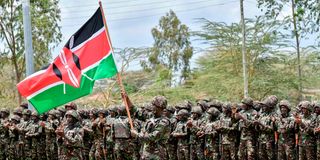KDF soldiers to remain longer in DR Congo

Kenya Defence Forces (KDF) soldiers attend a flag presentation ceremony by President William Ruto before their deployment to the Democratic Republic of Congo (DRC) as part of the East Africa Community Regional Force (EARDC) at the Embakasi Garrison in Nairobi on November 2, 2022.
What you need to know:
- The force is to deploy to Ituri, North Kivu and South Kivu provinces to “contain and, where necessary, combat the negative forces, and promote peace, stability and development in the greater East African region”.\
- It is also mandated to jointly plan and conduct ops with the local armed forces (FARDC) and support the Programme for Disarmament, Demobilization, Community Re-integration and Stabilization process(P-DDRCS).
Kenyan soldiers deployed to the Democratic Republic of Congo will stay longer in North Kivu province following the upcoming extension of the force’s tenure.
The KDF soldiers were deployed last November, under the East Africa Community Regional Force (EACRF), to support the restoration of peace and stability in Eastern DRC, where more than 120 armed groups have been fighting, leaving thousands of locals displaced and others dead.
The force was to intervene for an initial six months, under constant review to determine achievement of the desired milestone of restoring normalcy to the DRC, with the option of the extension of deployment for another six months.
The KDF deployment, however, happened about two months after the East African Community and the DRC government signed the Status of Force Agreement (SOFA)- on September 8 last year.
The agreement is the legal instrument that guides the force’s conduct, mandate and privileges while it is in the DRC. It also stipulates the support and facilitation that shall be granted to it by the host nation.
The deal expired Friday, ending the EACRF’s first tenure in the Eastern DRC. Consequently, the East African Community Secretariat has written to the DRC seeking its extension by a further six months - from April 1 to September this year.
“This request is for the renewal of the duration of operations and continued deployment of EACRF-DRC in Eastern DRC. It is preceded by the approval, by the Chiefs of Armed Forces of the EAC partner states of the evaluation, conducted in accordance with Article 26.1 of the SOFA, during their extraordinary meeting held on March 23 in Bujumbura, Burundi,” states the request by EAC Secretary-General Peter Mathuki.
According to the document, the force is to deploy to Ituri, North Kivu and South Kivu provinces to “contain and, where necessary, combat the negative forces, and promote peace, stability and development in the greater East African region”.
It is also mandated to jointly plan and conduct ops with the local armed forces (FARDC) and support the Programme for Disarmament, Demobilization, Community Re-integration and Stabilization process(P-DDRCS).
KDF’s achievements
Since the beginning, the force was to comprise troops from all EAC member states. However, Kenyan troops were the first to deploy in November last year while Burundi completed its deployment mid last month, with the last batch arriving at Goma International Airport on March 15.
KDF troops immediately secured Goma International Airport, which was under immense pressure of capture by M23 rebels, protected internally displaced persons in Kibumba and Rumaghabo, and secured other areas that had been vacated by the M23, including Kibati, Kibumba and Rumaghabo.
They also opened up the Bunagana-Kiwanja-Rutshuru-Goma route, gave humanitarian assistance through Medicap, escorted humanitarian aid and conducted joint patrols and training with the FARDC.
In the wake of civilian pressure to enter combat in Eastern DRC, the EACRF called for the deployment of the remaining troops and set out new boundaries that will see each of the participating troops accorded distinct locations, to extend a buffer zone against civilian invasion by the armed groups.
Troops in the Burundi National Defence Forces (BNDF) have since taken over key locations - Karuba, Mushaki and Kirolirwe - that were previously occupied by the M23, leading to a significant return of internally displaced persons to their homes.
The EACRF said the deployment of BNDF troops has further facilitated humanitarian assistance in the vacated areas and opened up the main supply route from Sake to Kitchanga, through Kirolirwe, where traffic comprising trucks, lorries and motorcycles facilitate the free movement of people and goods.
Ugandan army
The Uganda People’s Defence Forces (UPDF) deployed Friday while South Sudanese troops are expected to be airlifted to Goma by the KDF over the weekend.
The UPDF is expected to take charge of Bunagana, Kiwanja and Mabega as Kenyan forces take charge of Kibumba, Rumaghabo, Tongo, Kishishe and Bwiza. The KDF shall also be co-opted with the South Sudan forces at the Rumaghabo temporary operating base.
On Thursday, Ugandan President Yoweri Museveni stressed that the UPDF will not engage the M23 in battle but act a “neutral force”, occupying areas from where the rebel group has withdrawn as the Congolese sort out their political differences.
“We are not going to battle the M23. The Congo government and the M23 have agreed to a peace plan, which involves cessation of hostilities (fighting) [and] withdrawal of the M23 from some of the specified areas they had captured to other areas that have been agreed upon,” he said.
“Unless we are attacked, we are not there to fight. Fighting may come later if one of the non-State armed groups does not accept peace or what we all regard as reasonable conditions.”
The deployment of the remaining troops sets the stage for the full operationalisation of the ECARF headquarters, the nerve centre for command, control, communication and coordination of operations of the regional force.





